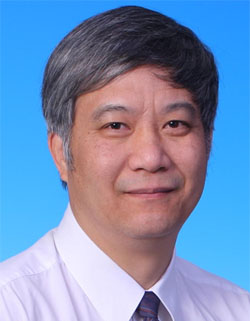 Ben Zhong Tang received his B.S. degree from South China University of Technology and Ph.D. degree from Kyoto University. He conducted postdoctoral research at University of Toronto and worked as a senior scientist in the central laboratory of NEOS Corp. He joined the Department of Chemistry at The Hong Kong University of Science & Technology as an assistant professor in 1994 and was promoted to chair professor in 2008. He was elected to the Chinese Academy of Sciences in 2009. He received a Natural Science Award from the Chinese Government and a Senior Research Fellowship Award from the Croucher Foundation in 2007. He is currently serving as Editor-in-Chief of RSC Polymer Chemistry Series, Editor of Polymer Bulletin, and News Contributor to Noteworthy Chemistry, an ACS electronic newsweekly.
Ben Zhong Tang received his B.S. degree from South China University of Technology and Ph.D. degree from Kyoto University. He conducted postdoctoral research at University of Toronto and worked as a senior scientist in the central laboratory of NEOS Corp. He joined the Department of Chemistry at The Hong Kong University of Science & Technology as an assistant professor in 1994 and was promoted to chair professor in 2008. He was elected to the Chinese Academy of Sciences in 2009. He received a Natural Science Award from the Chinese Government and a Senior Research Fellowship Award from the Croucher Foundation in 2007. He is currently serving as Editor-in-Chief of RSC Polymer Chemistry Series, Editor of Polymer Bulletin, and News Contributor to Noteworthy Chemistry, an ACS electronic newsweekly.
Please follow the link for further information on Ben’s laboratory and his recent paper in Polymer Chemistry.
What was your inspiration in becoming a chemist?
Many people become chemists because they love chemistry. This is not true in my case. I become a chemist because I was assigned to study chemistry. I was sort of an all-round pupil, good in almost every subject I had to learn at school, except for sports. When I took the entry examination for college study, I was chosen by a university and assigned to a major I did not apply for. Many people do things for which they have passion, but my approach is different: I cultivate my interest in the things I must do. This was largely true before I became an independent researcher as a faculty in Hong Kong. My motto is “enjoy doing the things I need to do”. This quality has enabled me to have a joyful career and quality life. I am proud of eventually becoming a chemist. I am happy to “play” with molecules everyday now that may lead to the creation of new knowledge, new materials, new technology…
What was the motivation behind the research in your recent Polymer Chemistry paper? (DOI: 10.1039/c2py00586g)
My research group has been interested in developing new polymerization reactions using alkyne monomers as building blocks. It has been a natural extension for us to study “click” polymerization. When Dr. Anjun Qin was working in my lab in Hong Kong as a postdoctoral associate, he successfully utilized click reaction to synthesize poly(triazole)s. The click polymerization, however, has to use metallic catalysts, which causes such problems as poor solubility of the polymers due to the complexation of the catalytic species with the triazole moieties in the reaction products and the difficulty in completely removing the catalyst residues that are adversely affect the physical, especially optical, properties of the polymers. Dr. Qin is now a faculty at Zhejiang University in Hangzhou, helping me run my research lab at the university. We worked with our students in Hangzhou and Hong Kong with a motivation to develop metal-free click polymerization. The work is exciting because we can now prepare functional poly(triazole)s with high regioregularity (F1,4 up to ~95%) in high yields (up to 100%) by simple heating in the absence of a metallic catalyst.
Why did you choose Polymer Chemistry to publish your work?
I am serving as a science news contributor to Noteworthy Chemistry, an ACS electronic newsweekly. I constantly read research papers published in many journals. Although Polymer Chemistry is a new journal, the papers it has published have attracted my attention because of their high quality. I have thus decided to send our work to Polymer Chemistry for publication. The review and publication have been fast. It has been a pleasant experience to communicate with the Editors.
In which upcoming conferences may our readers meet you?
I will attend the 44th IUPAC World Polymer Congress in Virginia on 24–29 June 2012 and the 244th ACS National Meeting in Philadelphia on 19–23 August 2012.
How do you spend your spare time?
Do aerobics, play tennis, sing songs, or listen to music.
Which profession would you choose if you were not a scientist?
I liked literature and arts when I was young. I might choose poet, novelist, painter or singer as my profession if I had choice.










